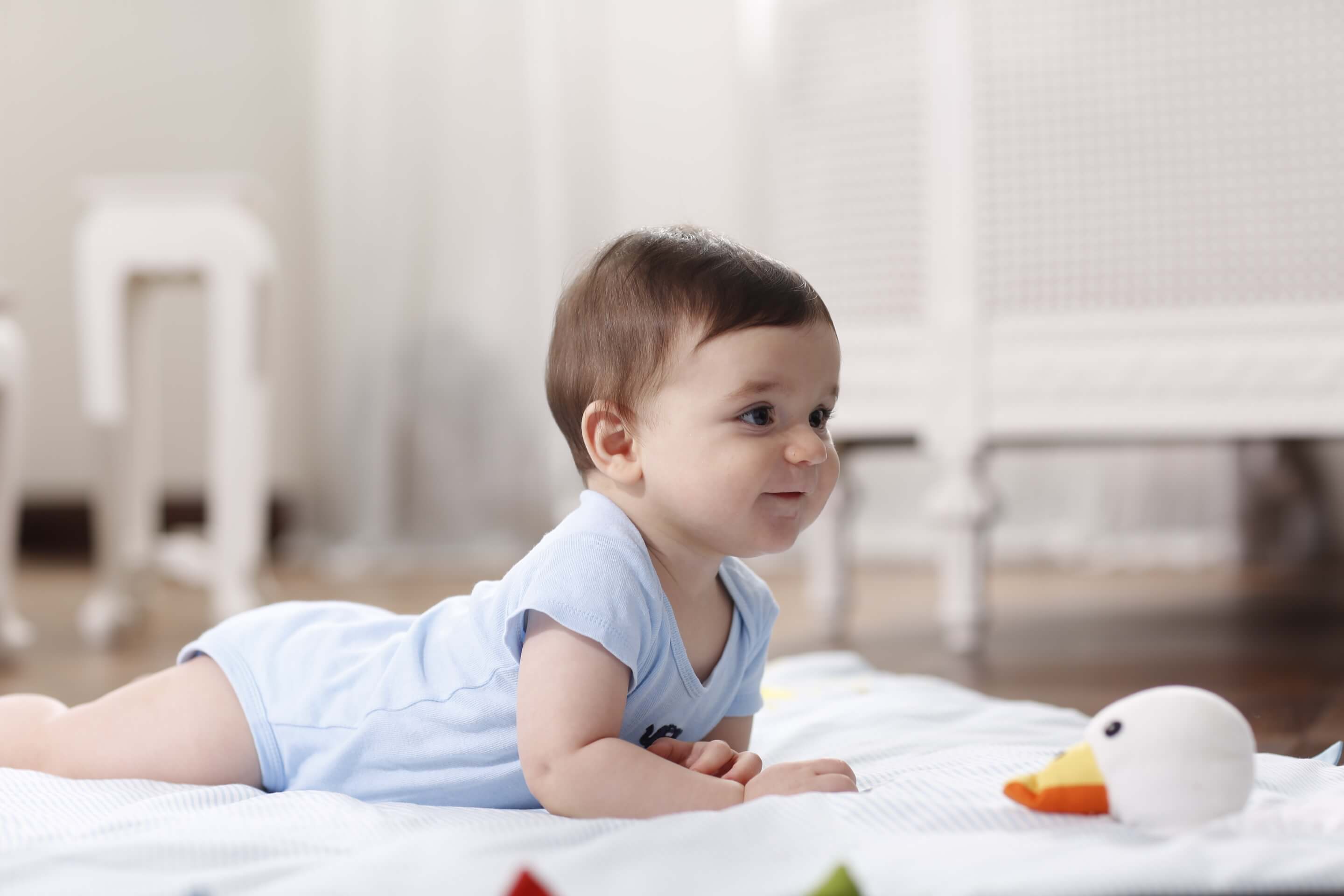Month 5

Your baby is growing steadily and becoming more mobile. It’s time to start babyproofing your home if you haven’t already. Read on for more information about your 5-month-old baby’s development milestones.
Month five is a transitional month in your baby’s development, as they start practising the skills they need to become mobile. Your 5 month old baby should be rolling and might even be bouncing on his legs getting ready to crawl. Do remember, though, that every baby will develop at their own pace, which might be earlier or later than average. Your doctor can advise if you’re at all concerned.
Even if your baby isn’t quite ready to become mobile just yet, it’s still a good idea to start thinking about baby-proofing your home, if you haven’t already.
Here’s what to expect from your 5 month old baby across physical, motor, mental, sensory emotional development.
PHYSICAL DEVELOPMENT
Your baby will continue to grow steadily, gaining around 450g – 560g in weight and growing around 2cms in length during month five. Your doctor should be charting your baby’s weight, length and head circumference on a growth chart, and you should be seeing your baby’s growth curve emerging.
By five months, most babies will be rolling over and some will have the core strength to sit unaided for a few seconds – just be careful to keep an eye on your baby while they’re practising these brand new skills. They’re also still likely to enjoy sitting with a cushion for support or in a comfortable baby chair, watching what’s going on in the world around them.
MOTOR DEVELOPMENT

You might notice your baby starting to bounce back onto their legs in a ready-to-crawl position. This is a strong sign that this major milestone isn’t too far away.
Your baby’s fine motor and hand/eye coordination skills should also be improving. By now they should be reaching and grasping for objects, and might even move objects from hand to hand.
They’re also likely to be fascinated by their own hands and feet, and might play with them, or even suck on them, to amuse themselves.
MENTAL DEVELOPMENT
A five month old baby is now starting to figure out how the world works. They might look for something if they drop it. They’re also starting to develop object permanence, which means that they recognise that an object exists, even if it’s out of sight. They might demonstrate this by reaching for an object that can only partly be seen.
Moreover, your baby should now be displaying good memory skills and will repeat actions that they enjoy – shaking a rattle, for example.
At five months you should hear your baby babbling away to you, themselves or their toys, and continuing to imitate the speech sounds that they hear.
SENSORY DEVELOPMENT
Baby will be using all of his senses to explore the world around him. It’s important to keep a close eye on what’s within your baby’s reach, especially as their mobility increases, as they want to touch and taste everything at this stage.
Most babies will be able to distinguish between bold colors, and some can recognise different shades of the same color. Anything colorful with lots of contrast will capture your baby’s interest.
Baby is also likely to enjoy music at five months old, so musical toys may get an excited, energetic response. Of course, the sound your baby loves the most is your voice, so don’t shy away from singing to them, even if it’s just along to the radio.
A five month old baby might now also be making sense of the sounds he hears – for example, making the connection between the sound of the dog barking and the dog. He might turn towards new sounds or even recognise his own name.






SOCIAL & EMOTIONAL DEVELOPMENT
Your baby will now have developed a strong bond with those closest to him and will reward his favorite people with smiles and excitement. However, some babies will start showing stranger anxiety at five months old. This can be especially difficult for working parents who have to leave their baby with another family member or childcare provider.
Learn about baby growth >>
Advice from the UK National Health Service (NHS) for dealing with stranger anxiety includes practising short separations, leaving baby with someone that they know well as you work towards longer periods apart. It also suggests leaving something comforting with your baby, like a soft toy that carries your scent.